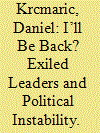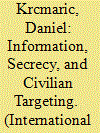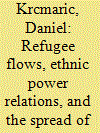|
|
|
Sort Order |
|
|
|
Items / Page
|
|
|
|
|
|
|
| Srl | Item |
| 1 |
ID:
189014


|
|
|
|
|
| Summary/Abstract |
Exile is often considered a useful political solution that can coax violent or unpopular leaders out of power. But these “golden parachutes” may come with a price. Specifically, do exiled leaders increase instability back in their home countries? In this paper, we outline the mechanisms through which exiled rulers can destabilize their home state’s politics and ultimately increase conflict. We present two types of evidence to support the argument. The first is a cross-national analysis that uses our original Leaders in Exile dataset to examine how exiled leaders shape the likelihood of civil conflicts, coups, and protests. The second is a cross-leader analysis designed to minimize inferential concerns by comparing cases where leaders escape into exile with cases where leaders are killed. In both tests, we find that exiled leaders are linked to political instability in their home countries.
|
|
|
|
|
|
|
|
|
|
|
|
|
|
|
|
| 2 |
ID:
167432


|
|
|
|
|
| Summary/Abstract |
Why do some states target civilians with violence whereas others exercise restraint? I argue regimes are more likely to victimize civilians when they believe that they can hide their actions and thereby avoid international and domestic blowback. This means that governments will prove less likely to commit atrocities in situations where information and communication technologies (ICTs) make secrecy and plausible deniability difficult. Statistical analyses provide strong support for this claim. The findings shed light on how ICTs shape violence and how states strategically employ secrecy.
|
|
|
|
|
|
|
|
|
|
|
|
|
|
|
|
| 3 |
ID:
187764


|
|
|
|
|
| Summary/Abstract |
Global policing efforts go far beyond combatting terrorism. The United States has tracked down war criminals in the former Yugoslavia, prosecuted Mexican drug kingpins in U.S. courts, transferred a Congolese warlord to the International Criminal Court, and even invaded foreign countries to apprehend wanted suspects. Likewise, Chinese police and intelligence forces crisscross the globe engaging in surveillance, abductions, and forced repatriations. But global policing activities are hard to study because they tend to occur “in the shadows.” Extradition treaties—agreements that facilitate the formal surrender of wanted fugitives from one country to another—represent a unique part of the global policing architecture that is directly observable. An original dataset of every extradition treaty that the United States has signed since its independence shows that extradition cooperation is not an automatic response to the globalization of crime. Instead, it is an extension of geopolitical competition. Geopolitical concerns are crucial because many states try to weaponize extradition treaties to target their political opponents living abroad, not just common criminals. Future research should reconceptualize the role of individuals in international security because many governments believe that a single person—whether a dissident, a rebel, or a terrorist—can imperil their national security.
|
|
|
|
|
|
|
|
|
|
|
|
|
|
|
|
| 4 |
ID:
130275


|
|
|
|
|
| Publication |
2014.
|
| Summary/Abstract |
Why do some refugee flows cause conflict in the host state and others do not? Drawing on bargaining models of war, I argue refugees are especially likely to cause conflict when they alter the host state's ethnic balance of power. More specifically, I explain why multiple informational and commitment problems arise when refugee flows produce a rapid shift in relative power between ethnic groups. As an empirical strategy, I examine a unique controlled comparison made possible by the influx of Kosovar refugees into Albania and Macedonia in 1999 that eliminates over a dozen competing explanations for civil conflict. I then use process tracing to demonstrate how a change in relative power between ethnic groups fostered violence in Macedonia, whereas the preservation of the ethnic balance facilitated a peaceful refugee flow into Albania. This evidence, though tentative, indicates that a refugee flow's effect on the host state's ethnic balance of power can help explain whether the state experiences peace or conflict.
|
|
|
|
|
|
|
|
|
|
|
|
|
|
|
|
| 5 |
ID:
157581


|
|
|
|
|
| Summary/Abstract |
Why do some civil wars feature the mass killing of civilians while others do not? Recent research answers this question by adopting a ‘varieties of civil war’ approach that distinguishes between guerrilla and conventional civil wars. One particularly influential claim is that guerrilla wars feature more civilian victimization because mass killing is an attractive strategy for states attempting to eliminate the civilian support base of an insurgency. In this article, I suggest that there are two reasons to question this ‘draining the sea’ argument. First, the logic of ‘hearts and minds’ during guerrilla wars implies that protecting civilians – not killing them – is the key to success during counterinsurgency. Second, unpacking the nature of fighting in conventional wars gives compelling reasons to think that they could be particularly deadly for civilians caught in the war’s path. After deriving competing predictions on the relationship between civil war type and mass killing, I offer an empirical test by pairing a recently released dataset on the ‘technology of rebellion’ featured in civil wars with a more nuanced dataset of mass killing than those used in several previous studies. Contrary to the conventional wisdom, I find that mass killing onset is more likely to occur during conventional wars than during guerrilla wars.
|
|
|
|
|
|
|
|
|
|
|
|
|
|
|
|
| 6 |
ID:
152123


|
|
|
|
|
| Summary/Abstract |
Many theories attempt to explain why some countries democratize and others do not. Existing accounts, however, focus almost exclusively on structural factors and ignore individual leaders. In this article, we argue that leaders educated at Western universities are more likely to democratize than other leaders because Western education socializes leaders to prefer democracy and creates transnational linkages that alter the strategic calculus of democratization. Utilizing an original data set on the specific colleges and universities world leaders attended, we show that Western-educated leaders significantly and substantively improve a country’s democratization prospects.
|
|
|
|
|
|
|
|
|
|
|
|
|
|
|
|
|
|
|
|
|